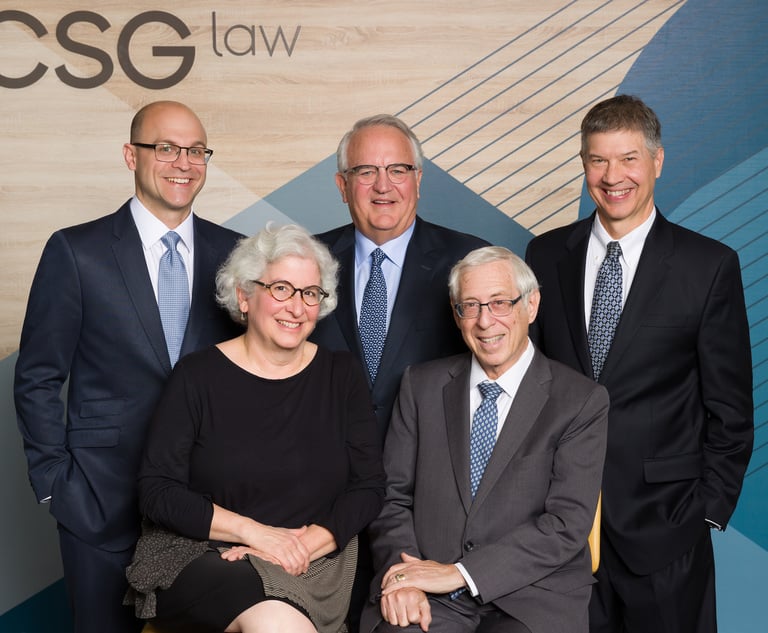 U.S. Third Circuit Judge Patty Shwartz/courtesy photo
U.S. Third Circuit Judge Patty Shwartz/courtesy photo3rd Circuit Affirms $591K Undue Influence Award Against Lawyer
The ruling affirms an award of $391,040 in damages and $200,495 in prejudgment interest.
July 10, 2020 at 03:29 PM
4 minute read
The U.S. Court of Appeals for the Third Circuit has upheld a ruling directing attorney John Sogliuzzo to repay $591,535 on a claim that he exercised undue influence to take the assets of an elderly aunt.
The Third Circuit rejected Sogliuzzo's claims that the trial court made errors when it entered the order. Sogliuzzo was sued by his sister, Jane Adkins, who claimed he misappropriated the funds of Mary Grimley. The ruling affirms an award of $391,040 in damages and $200,495 in prejudgment interest to Adkins. Adkins claimed that her brother took $70,000 in cash that Grimley was storing in her home, and that he cashed in $321,040 in bonds belonging to Grimley.
Sogliuzzo, a solo practitioner in Maplewood who represented himself, claimed on appeal that U.S. District Judge Susan Wigenton wrongly rejected his motion for reconsideration as untimely. He also claimed Wigenton erred by failing to conduct a hearing on his use of the funds for Grimley's benefit and that he should have been given more time to object to the proposed judgment.
Third Circuit Judges Patty Shwartz, Joseph Greenaway Jr. and Marjorie Rendell agreed that Wigenton erred by finding the motion for reconsideration time-barred. Sogliuzzo moved for reconsideration under Rules 52(b) and 59(e) of the Federal Rules of Civil Procedure 25 days after Wigenton signed the judgment. Wigenton found the motion untimely because it was not filed within 14 days of the entry of the order of judgment, as required by District of New Jersey Local Civil Rule 7.1(i).
Shwartz, writing for the court, said Local Rule 7.1(i) provides that it does not apply to motions filed under Federal Rules of Civil Procedure 52 and 59, which must be filed within 28 days of the entry of judgment. Since Sogliuzzo's motion was filed within 25 days of the final judgment, it was timely, Shwartz wrote. Still, Sogliuzzo presented no basis to reconsider or amend the judgment, Shwartz wrote.
The Third Circuit also found Wigenton acted within her discretion when she declined to hold a hearing on the use of funds for Grimley's benefit. Sogliuzzo was not precluded from presenting evidence that would show the funds at issue were used for Grimley's benefit, Shwartz said. Consequently, he faced no undue prejudice from a refusal to take new testimony, the judge said.
The Third Circuit also rejected Sogliuzzo's claim that Wigenton signed the judgment prematurely. Local Rule 58.1(b) allows the prevailing party to submit a proposed judgment and gives the adversary seven days to object to its contents, the rule does not require the court to wait seven days to sign the order, Shwartz said.
Wigenton initially found Sogliuzzo exercised undue influence against Grimley but declined to award damages, deferring to a separate state court case brought on behalf of the estate. But in 2017, the Third Circuit rejected that argument and sent the case back to Wigenton for calculation of damages.
Sogliuzzo is no stranger to allegations of undue influence against elderly relatives. He was also named as a defendant in a separate suit filed on behalf of the estate of Jane Sogliuzzo, the late mother of Sogliuzzo and Adkins. A judgment for $520,000 was entered against Sogliuzzo in that case. Adkins, the estate's executrix, claimed Sogliuzzo siphoned off thousands of dollars of their mother's funds in the years before her death, and a forensic accountant retained by the estate found that Sogliuzzo used his mother's funds to make payments to his law practice and to pay his children's tuition at The Pingry School.
Sogliuzzo did not return call about the ruling. Dennis Gleason of Jardim, Meisner & Susser in Florham Park, and Mark Miller of Dubeck & Miller in Morristown, represented Adkins. Miller said he believes the Third Circuit made the right ruling. Litigation in the dispute has lasted more than a decade, but is nearing the end of the line, although his client now faces the challenge of collecting what she is owed, he said.
|This content has been archived. It is available through our partners, LexisNexis® and Bloomberg Law.
To view this content, please continue to their sites.
Not a Lexis Subscriber?
Subscribe Now
Not a Bloomberg Law Subscriber?
Subscribe Now
NOT FOR REPRINT
© 2024 ALM Global, LLC, All Rights Reserved. Request academic re-use from www.copyright.com. All other uses, submit a request to [email protected]. For more information visit Asset & Logo Licensing.
You Might Like
View All
Appellate Div. Follows Fed Reasoning on Recusal for Legislator-Turned-Judge
4 minute read
Chiesa Shahinian Bolsters Corporate Practice With 5 From Newark Boutique
5 minute read
On the Move and After Hours: Brach Eichler; Cooper Levenson; Marshall Dennehey; Archer; Sills Cummis
7 minute read
'A Mockery' of Deposition Rules: Walgreens Wins Sanctions Dispute Over Corporate Witness Allegedly Unfamiliar With Company
Trending Stories
Who Got The Work
Michael G. Bongiorno, Andrew Scott Dulberg and Elizabeth E. Driscoll from Wilmer Cutler Pickering Hale and Dorr have stepped in to represent Symbotic Inc., an A.I.-enabled technology platform that focuses on increasing supply chain efficiency, and other defendants in a pending shareholder derivative lawsuit. The case, filed Oct. 2 in Massachusetts District Court by the Brown Law Firm on behalf of Stephen Austen, accuses certain officers and directors of misleading investors in regard to Symbotic's potential for margin growth by failing to disclose that the company was not equipped to timely deploy its systems or manage expenses through project delays. The case, assigned to U.S. District Judge Nathaniel M. Gorton, is 1:24-cv-12522, Austen v. Cohen et al.
Who Got The Work
Edmund Polubinski and Marie Killmond of Davis Polk & Wardwell have entered appearances for data platform software development company MongoDB and other defendants in a pending shareholder derivative lawsuit. The action, filed Oct. 7 in New York Southern District Court by the Brown Law Firm, accuses the company's directors and/or officers of falsely expressing confidence in the company’s restructuring of its sales incentive plan and downplaying the severity of decreases in its upfront commitments. The case is 1:24-cv-07594, Roy v. Ittycheria et al.
Who Got The Work
Amy O. Bruchs and Kurt F. Ellison of Michael Best & Friedrich have entered appearances for Epic Systems Corp. in a pending employment discrimination lawsuit. The suit was filed Sept. 7 in Wisconsin Western District Court by Levine Eisberner LLC and Siri & Glimstad on behalf of a project manager who claims that he was wrongfully terminated after applying for a religious exemption to the defendant's COVID-19 vaccine mandate. The case, assigned to U.S. Magistrate Judge Anita Marie Boor, is 3:24-cv-00630, Secker, Nathan v. Epic Systems Corporation.
Who Got The Work
David X. Sullivan, Thomas J. Finn and Gregory A. Hall from McCarter & English have entered appearances for Sunrun Installation Services in a pending civil rights lawsuit. The complaint was filed Sept. 4 in Connecticut District Court by attorney Robert M. Berke on behalf of former employee George Edward Steins, who was arrested and charged with employing an unregistered home improvement salesperson. The complaint alleges that had Sunrun informed the Connecticut Department of Consumer Protection that the plaintiff's employment had ended in 2017 and that he no longer held Sunrun's home improvement contractor license, he would not have been hit with charges, which were dismissed in May 2024. The case, assigned to U.S. District Judge Jeffrey A. Meyer, is 3:24-cv-01423, Steins v. Sunrun, Inc. et al.
Who Got The Work
Greenberg Traurig shareholder Joshua L. Raskin has entered an appearance for boohoo.com UK Ltd. in a pending patent infringement lawsuit. The suit, filed Sept. 3 in Texas Eastern District Court by Rozier Hardt McDonough on behalf of Alto Dynamics, asserts five patents related to an online shopping platform. The case, assigned to U.S. District Judge Rodney Gilstrap, is 2:24-cv-00719, Alto Dynamics, LLC v. boohoo.com UK Limited.






